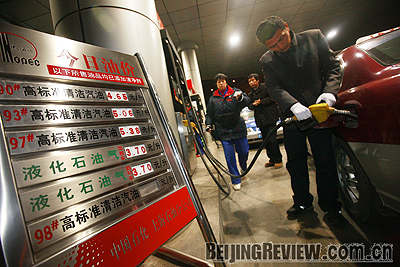|
|

FUEL REVAMP: The country's new oil taxation and pricing system is expected to increase oil efficiency at a time of energy shortages | After years of waiting and debating, the government has finally decided to shake up the country's oil pricing and taxation system, combining a big hike in fuel taxes for consumers and retail price cuts for refined oil.
As of January 1, the consumption taxes on gasoline and diesel were raised fivefold and eightfold, or by 0.8 yuan ($0.12) and 0.7 yuan ($.10) per liter, respectively, according to the National Development and Reform Commission (NDRC), the country's top economic planner.
Meanwhile, the fuel tax, which took effect on January 1, replaces six different fees, including some road and waterway tolls and charges. The government also ordered that pre-collected road tolls be refunded.
The NDRC said the policies were designed to spark more efficient energy usage and promote small-capacity cars with low emissions, although they could also have the effect of curbing domestic oil demand.
To cushion the blow to consumers, the government lowered the price caps on gasoline by about 14 percent, on diesel by about 18 percent and on aviation kerosene by a hefty 32 percent, starting on December 19, 2008.
The collapse of international crude prices has given China some breathing space to introduce some changes to its retail oil pricing and taxation regime. The country's domestic retail price has stayed almost static since 2007 under a government-set pricing system, while the international price has lost almost two thirds of its value after reaching a peak of $147 a barrel last July. The new retail price of oil here will still be double that of the United States.
The price of crude oil on the international market has been lingering at a four-year low of $40 a barrel in recent months as the world economic gloom has eroded global demand. Even OPEC's biggest-ever production cut last December has failed to bump up the price.
Zhuang Jian, a senior economist at the Asian Development Bank, told Beijing Review that the price cut will deliver a timid boost to sagging economic growth by fueling domestic demand as well as bring some relief for oil-dependent sectors, such as automakers and airlines.
Feng Fei, a senior economist at the Development Research Center of the State Council, echoed Zhuang's opinion and said the new prices and taxes were in the long-term interest of the country, because they would help deter excessive energy consumption and promote environmentally friendly transportation in the world's second largest oil-consuming country. The elimination of road tolls also would alleviate some unnecessary cost burdens for consumers who are widely considered a pillar force in digging the economy out of stagnation, Feng added.
| 